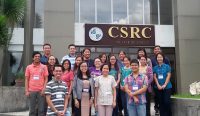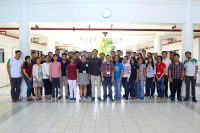A 2-day workshop provided by Dr. Nelzo Ereful, Post-doctoral Researcher (Bioinformatics) at the National Institute of Agricultural Botany, Cambridge, UK

TGIF Seminar: July 22, 2016
Held usually at 3:30pm on Fridays, TGIF discussions are informal talks on current scientific topics and events.

TGIF Seminar: July 15, 2016
On C4 Rice, the PhilRice NGS Experience, and an exit report on the “Life and Times of DSCF”

Assembly, Annotation, Variant Calling, and Phylogenetic Analysis of Bacterial Genomes (June 2016)
Assembly, Annotation, Variant Calling, and Phylogenetic Analysis of Bacterial Genomes (June 2016) Workshop by the Core Facility for Bioinformatics

Signaling-mediated epigenetic silencing of tumor suppressor genes in ovarian cancer
Aberrant TGFβ signaling pathway may alter the expression of down-stream targets and promotes ovarian carcinogenesis. However, the mechanism of this impairment is not fully understood. By ChIP-chip and expression microarray, we have previously identified several SMAD4 targets in an immortalized ovarian surface epithelial cells. Bioinformatic analyses identified several SMAD transcriptional modules that predict expression changes after TGF-β activation. Knockdown of SMAD4 in CP70 ovarian cancer cells showed an increase in promoter methylation in some of those SMAD4 targets as demonstrated by sequencing-based analysis.

Dr. Zeni Magbanua: My Work on Genomics
Held usually at 3:30pm on Fridays, TGIF discussions are informal talks on current scientific topics and events. The gathering is sponsored by the PGC, NIMBB (National Institute of Molecular Biology & Biotechnology) at UP Diliman, and the IB (Institute of Biology) at UP Diliman.

Genome Assembly, Annotation and Variant Calling Training and Workshop (June 2016)
Genome Assembly, Annotation and Variant Calling Training and Workshop (June 2016) by Core Facility for Bioinformatics

Implications of hybrid epithelial/mesenchymal phenotype in metastasis: how theory can help understand cancer biology better
Metastasis claims 90% of all cancer-related deaths and remains clinically insuperable. The hallmarks of metastases are processes known as Epithelial to Mesenchymal Transition (EMT) and its reverse Mesenchymal to Epithelial Transition (MET) that enable primary carcinoma cells to migrate and start new tumors at distant organs. I will present an integrated theoretical and experimental approach that elucidates how cancer cells undergo EMT and MET, and how these transitions affect their ability to initiate new tumors.

Cellular Senescence
Held usually at 3:30pm on Fridays, TGIF discussions are informal talks on current scientific topics and events.

Bioinformatics in Influenza surveillance: From sequence to structure to molecular mechanisms with the FluSurver
Bioinformatics can play an important role in infectious disease surveillance and research from epidemiological data processing with geographic and temporal visualization to comparing genome phylogenies and structural modelling of mutations. As a classical example, interest in new influenza outbreaks as well as regular surveillance of circulating seasonal strains produce a constant flow of influenza genome sequences that need to be analysed and interpreted for epidemiological and phenotypic features.

